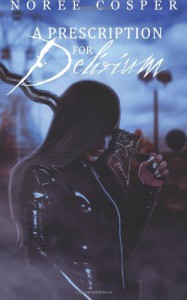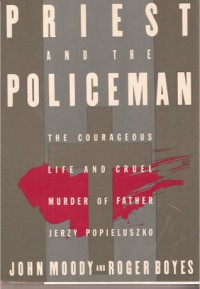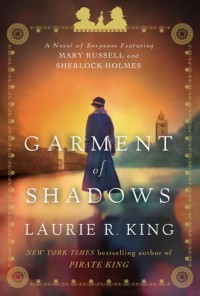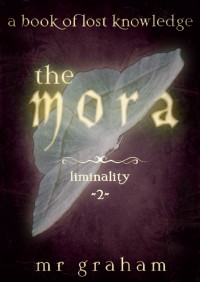20138
Followers
7
Following
Qui Est In Literis - MR Graham's Ramblings
MR Graham loves books. She loves the feel, the smell, and the stories inside. After careful consideration, however, she has decided the taste leaves something to be desired.
Morrigan's Brood: Morrigan's Brood Book I
 A treasure-trove of heavy research infused with magic and myth. Written in a slightly more formal register than I usually like, but well done.
A treasure-trove of heavy research infused with magic and myth. Written in a slightly more formal register than I usually like, but well done.
Sherlock Holmes & The Adventure of Ichabod Reed
 The Premise:
The Premise: A young man – Malcolm Durstwell – arrives in Baker Street, concerned and outraged that, due to a strange and unexpected provision of his late uncle’s will, he and his family will be evicted from their home. The benefactor, Ichabod Reed, is unknown to the family and has never been seen, instead choosing to conduct his legal affairs by proxy. Holmes sees nothing criminal in the case and refuses to take it on, until Malcolm Durstwell is found dead on the train the following morning.
The Good:
Ichabod Reed was an enjoyable little story that got me through an hour at the shoe store, which will ensure my favourable opinion of pretty much anything.
The mystery engaged me directly from the beginning; it isn’t terribly often that the client is also the victim, which created interest for me straight from the start.
The language was, for the most part, closely complementary to the Canon, though somewhat more succinct so as not to alienate a modern reader.
The Watson was admirably sharp and considerate – not the bumbling idiot he is sometimes made out to be – and I really do appreciate that. Watson is a physician, after all. The body of medical knowledge may have been much narrower in the nineteenth century, but there has never been a point in time at which idiots could make it through medical school and establish themselves in respectable practice.
The Bad – SPOILERS:
Some of the clues did not seem to match up. For instance, though heredity was still a fledgling science, I can’t see both Holmes and Watson assuming that two brown-eyed parents could not produce blue-eyed offspring. And while I can’t claim any first hand knowledge, my understanding is that nightshade berries are too sweet to be concealed in so bland a food as an egg sandwich, and the alkaloid extracts would be too bitter. Additionally, death by nightshade typically involves horrific hallucinations, agitation, convulsions, and painful vomiting. It’s very unlikely that poor Malcolm could have died quietly of belladonna poisoning without attracting any notice.
It is a personal preference, but I don’t find the killing of canon characters to be good form in pastiche. Unless Langlinais has some clever trick up her sleeve, reserved for later Adventures, I can’t approve of the death of Mycroft. (However, if she absolutely had to kill off Mycroft, she did it well; another writer might have penned some maudlin dialogue for the bereaved Sherlock, but her Sherlock handled the loss as dispassionately and reservedly as the real one would.)
In Conclusion:
I enjoyed it. It was well-considered, well-written, and well-edited, if not as well-researched. When one has run out of Adventures and hasn’t the time for a novel, Langlinais’s New Adventures are an agreeable substitute.
A Prescription for Delirium: A Van Helsing Organization Novel: 1
 The Premise:
The Premise:Small-town Hampton, Texas is attracting demons. Fortunately for Hampton, it’s also attracting demon-hunters and Van Helsings, who are determined to prevent the town from being overrun by violent madmen and horrible, demonic creatures that may or may not once have been human. The three Van Helsing brothers are more accustomed to fighting vampires, though, and Gabriella di Luca, resident demon expert, has a few traits that trigger suspicion. There is much bickering, mouthing off, and mistrust in all directions, which makes working together to end the threat all the more difficult.
The Good:
The Good is pretty much everything. I loved the characters most, though. Prescription for Delirium is definitely a character-driven story, and everyone we come across is meaty and awesome. Gabby is a strong female protagonist with plenty of problems and a bucket and a half of insecurity, but her foibles are human and real, and they do not at all detract from the fact that she is a powerful, experienced woman. The Van Helsing siblings made me nervous, because it can be difficult to create fictional relatives who aren’t clones of each other, but these perfectly balanced family resemblance with distinct personalities. Honestly, I spend most of the book desperately wanting to give Tres and Esais a great big hug. Adrian is seriously asking for a cattle prod in the arse, but I’m scared of him, so I’ll pass. The villains are chilling.
Despite being character-driven, the plot does not at all fall by the wayside. I found it really original, and I love it when authors bring back Van Helsings in fun ways.
I also love fantasy set in Texas. The Lone Star State really doesn’t get enough love from fantasy authors, and I love Cosper’s depiction of small-town Texas. I could practically feel the grit blowing up from the dirt roads and smell the funnel cake from the county carnival. It’s also refreshing to see small-town Texans NOT depicted as toothless hicks in overalls, which seems to be the stereotype we get when we’re represented at all. Cosper’s Texans are realistic, welcoming, and a bit reactionary, and they cope pretty well with being attacked by Hell’s minions. Of course, I understand that Cosper herself is a resident of our noble State, so it makes sense that she would understand just how awesome we are.
The Bad:
There’s not much I would really call bad, only a few things I felt could be improved. The plot felt a little bit rushed, in places. I would have liked to see more of Gabriella’s preparations and interactions with the Van Helsing boys. There was a lot of running and driving and fighting, which is all very exciting, but it left very little time to figure out what just happened before diving headlong into the next piece of action.
One thing that did bother me (but is purely a matter of author prerogative, and as such cannot really be criticized, except as my own little peeve) was the apparent genealogy of the Van Helsings. Cosper’s Van Helsings seem to be an old Romanian family, and she has them speak to one another in Romanian several times through the course of the book. She never explains how they went from the Netherlands to Romania, if that was the case, or how they intermarried with Romanians or emigrated, or whatever happened, there. Considering how well everything else in the book was considered and researched, I seriously doubt that it was just an oversight, and I understand there are several more books in which this might be explained, but it puzzled my inner Stoker fan.
In Conclusion:
I’m really looking forward to the next volume. Cosper’s mythology is fascinating, and I can’t wait to explore it further.
A Queen's Tale
 So, as I understand it, this volume is a sort of introduction to Dee's upcoming Shadows of Avalon series. It was a really fun first look, even better for fans of Arthurian legend. It breaks out of some of the archetypes that have become prevalent in the genre, and while I can understand that some Arthurian fans might take issue with that, I found Dee's little spins very interesting.
So, as I understand it, this volume is a sort of introduction to Dee's upcoming Shadows of Avalon series. It was a really fun first look, even better for fans of Arthurian legend. It breaks out of some of the archetypes that have become prevalent in the genre, and while I can understand that some Arthurian fans might take issue with that, I found Dee's little spins very interesting. A Queen's Tale was a good little love story, set against a backdrop of epic fantasy.
There were some technical errors, the sort of thing one can expect to find in an ebook, but the story more than made up for them.
 The Premise:
The Premise: Chemistry is a modern reimagining of The Hunchback of Notre Dame, told in first-person, present tense from the perspective of the high school senior Claude Frollo. It tracks his dysfunctional relationships with everyone who looks up to him; his growing obsession with the new girl, Esmeralda; and his downward spiral into self-destructive sociopathy.
The Good:
Chemistry is addicting. I ploughed through it in less than a day, and even when I had to put it down, I stayed caught in the horrible, piercing, electrifying world Lamm has created inside Claude’s head.
Insanity is becoming an over-used trope, especially in tragic romance, but Lamm refreshes it and makes it unnervingly real. Claude is a maniac – dangerously charismatic inside his own mind, even though he cannot be in real life. The horrors he concocts are made all the more filthy by the good he has done and the heights he dreams of reaching. The worst part is that, right up to the end, you want him to win. He does a fantastic job of convincing the reader that he deserves his little sins, even though the words themselves press constantly for condemnation.
The story Lamm has woven is enthralling, stomach-turning in the best possible way. I went in with high expectations and came away with aching teeth and a burning throat, simultaneously shattered and satisfied.
The Bad:
I’m still a bit shell-shocked.
In Conclusion:
Masterful.
Eggs, Butter, Sugar and Disaster
 The Good:
The Good: Eggs, Butter, Sugar and Disaster reads like a Young Adult mashup of PG Wodeouse, Terry Pratchett, and JK Rowling. Wright has constructed a brilliantly humorous world of selectively-modernized mythology in which there are no longer enough warriors to fill up Valhalla, gods advertize, dwarves are contractors, and deities carry credit cards. It’s all terribly silly, but the really fantastic part is that it all makes perfect sense.
Wright’s cast of characters starts off strong and only gets better. We are introduced to Seralina, the newbie part-time valkyrie and Goddess of Puddings, whose good intentions don’t always yield ideal results. Hermes, the divine mailman, wants to start his own logistics service but isn’t quite sure where to start. Freya, goddess of love and war, is tired of all the drunks wandering around Asgard and wants to inject some class into her establishment – with a touch of Japanese flair. Even the secondary characters are fully-fleshed and endearing (Heimdall with his gold teeth and his puppy-dog demeanor; jolly uncle Osiris, inexplicably green and in need of a vacation; the snarky, snobbish Domestic Goddess in her frilly apron).
Seralina herself is not the standard heroine. She is not seeking love or destiny. She isn’t fated for something special. Like the rest of us, she makes mistakes and just has to plod through whatever life throws at her, doing the best she can with what she’s got. For a Goddess of Puddings, she’s pretty awesome.
The humour is the best bit. It’s subtle and relies largely on wordplay, which is my favourite sort. Mythology, religion, and the human condition provide much of Wright’s material, interspersed with just the right dosage of goofy puns.
The Bad:
There’s not much I can really call “bad” about E,B,S&D. The plot was a little slow in a couple of places, and I did notice some tense scenes where the extended dialogue was a little improbable. There were a few typos – missing periods, comma splices, and the like – but infrequent enough to be overlooked.
My only real complain is that Seralina’s pudding cult – which is given prominent mention at the very top of the first page – is sort of glossed over. I would have liked to see a lot more of them.
In Conclusion:
It’s not my usual genre, but I loved it. The characters are adorable, the plot a hoot and a half, the ending satisfying. I’d read a sequel.
The Priest and the Policeman: The Courageous Life and Cruel Murder of Father Jerzy Popieluszko
 This heart-wrenching account gets deep into the heads of all of the players involved in this horrifying debacle of late Communist-era Poland. In places, it seemed a little fictionalized to me, but the style worked well to create the appropriate sympathy for these people.
This heart-wrenching account gets deep into the heads of all of the players involved in this horrifying debacle of late Communist-era Poland. In places, it seemed a little fictionalized to me, but the style worked well to create the appropriate sympathy for these people.
The Sin Collector (Book 1)
 The Premise:
The Premise:Liliana, Sin Collector, an immortal and invulnerable creature who seems to have made Last Rites into a supernatural power, is suddenly confronted with a creepy clan of angry humans who have figured out how to kill Liliana’s kind – the Castus. What started as a fun globe-hopping adventure with a cute guy she knew from childhood turns into a miasma of Sin Collector politics, a love triangle, and the Castus trying to kill everyone.
The Good:
I had never heard of a paranormal story with quite this brand of creature before. I love the idea of the Sin Collectors and what they do. In short, the Sin Collectors are born to perform what is essentially the Last Rites for the dying. They draw out the sins of the subject and take those sins upon themselves, allowing the subject to pass unburdened into the next life. It’s a fascinating mythos, and I wish it had been explored further.
The villains were pretty spiffy, as well. Seeing themselves as a holy order, the Castus are outraged that Collectors would dare absorb the sins of the truly evil and allow genuinely bad people a chance at salvation. Honestly, I can see that happening. Just look at some of the religious conflicts that go on in the world today. They all pretty much boil down to “We’re good people, and you’re not, and you’re only worse because you claim you’re good people, too.” Underneath the magic and the sorcery, the hatred of the Castus is very true.
The work is too short to allow for really deep character development, but I liked most of the characters and could feel a strongly-developed backstory even for minor characters. The world is well-fleshed out, and so are most of its inhabitants. Honestly, one of my favourites only barely got any screen time. I would have loved to see more of the mysterious Rebecca, a Collector so old she is actually beginning to show her age.
Liliana’s character also starts out very strong. She is exasperated with her life, tired of her job, deprived of a real purpose by modernity’s rejection of the supernatural, and she adds a lovely dose of snark and humour to her narration. Unfortunately, that leads me to
The Bad:
For a hundred-and-twenty-something immortal who has seen far more than her fair share of death, suffering, and evil, Liliana comes into her whole ordeal with a startlingly juvenile mindset. She has a tendency to storm off in a fit and slam doors when she gets upset. I had thought for a while that she might be psychologically frozen at twenty years, when some people do still act like that, but other Collectors were shown as wise and hyper-mature as a result of their age and experience. I would have liked to see more of that in Liliana.
***BEGIN SPOILERS***
While Liliana is portrayed as being very smart and worldly, some of her actions do not reflect that. For instance, when her childhood friend William, another Collector, reappears more after more than a hundred years of no contact, she leaves behind the entire life she has built and goes to Ireland with him. While I can understand her boredom and thirst for adventure, the impression I got is that she is willing to leave everything she has worked for primarily because William is hot.
When she begins to suspect William of being traitorous and possibly homicidal, she pushes her suspicions under the rug and has frantic end-of-the-world sex with him. The line is actually “LiLi this could be our last night on earth. Don’t you think we should enjoy it?” There is no mention of her regretting this decision when her suspicions are proven right. It really felt more like an excuse to insert sex, however tastefully described, than an attempt to move the plot forward.
And then, once the traitorous William has been disposed of, Liliana falls in love with her father-figure. Granted, this father figure is physically stuck at twenty years old, like all Collectors, and granted, Liliana has not seen him for some time; however, he is still more than four hundred years older than she is, and he raised her from a small child, and he did kidnap her in order to perform a magical ritual on her against her will.
In some ways, the hostility between William and Olexander (the father-figure) reminds me of the Edward-Jacob dynamic in Twilight, not least because the hostility apparently stems entirely from the two of them fighting over the girl.
***END SPOILERS***
Finally, the book could use a good copyedit. Nearly all of the dialogue is incorrectly capitalised and punctuated. Where there should be a comma and a lowercase, there is nearly always a period and a capital letter, and vice versa. Since the capitalisation and punctuation are consistent, I am more inclined to think that they are not merely typos. I am a strong proponent of using sentence fragments for emphasis, but in The Sin Collector, their frequency is distracting, and in several places, a sentence changes directions in mid-thought or is missing a necessary word.
In Conclusion:
I enjoyed the story. I found it well-paced and highly original, though I felt that the love triangle eventually overshadowed the element of suspense and danger that I liked so much. I hesitate to call Liliana a strong female lead, but as this is the first book in a trilogy, I feel she could easily evolve into a powerful woman. Anyone without my grammar-nazi tendencies could probably get past the syntax issues.
The Sin Collector was not exactly my cup of tea, but I will probably be looking for the next book in the series when it comes out in 2013, and I can see this developing a massive following.
Mr. Churchill's Secretary: A Novel
 Personally, I loved Mr. Churchill's Secretary. Maggie is quick and spunky, the supporting characters actually do provide support, and the story itself is light enough for holiday reading but intense enough to keep my attention for the majority of a twenty-four hour car trip. The history is well-articulated and atmospheric without being an oppressive infodump, though I suspect that some historical liberties were taken in the interest of driving the plot; however, it was nothing that would make my inner history buff growl. Honestly, I like seeing strong, feminist characters ahead of their time, and I absolutely love seeing strong, feminist characters who are strong because of their intellect.
Personally, I loved Mr. Churchill's Secretary. Maggie is quick and spunky, the supporting characters actually do provide support, and the story itself is light enough for holiday reading but intense enough to keep my attention for the majority of a twenty-four hour car trip. The history is well-articulated and atmospheric without being an oppressive infodump, though I suspect that some historical liberties were taken in the interest of driving the plot; however, it was nothing that would make my inner history buff growl. Honestly, I like seeing strong, feminist characters ahead of their time, and I absolutely love seeing strong, feminist characters who are strong because of their intellect.In short: fun story, fun characters, occasional deep moments, little to cause a mystery fan discomfort.
Garment of Shadows: A novel of suspense featuring Mary Russell and Sherlock Holmes
 I started reading Laurie R. King’s Garment of Shadows the day it came out, and I think I should begin by saying that it has absolutely killed me, not having time to finish it until now. Cliffhanger chapters are one thing when you know you can pick the book up again in an hour or so. Waiting days between readings is torture.
I started reading Laurie R. King’s Garment of Shadows the day it came out, and I think I should begin by saying that it has absolutely killed me, not having time to finish it until now. Cliffhanger chapters are one thing when you know you can pick the book up again in an hour or so. Waiting days between readings is torture.I truly have nothing but praise for this installment of the Mary Russell series. The last several books have gotten very dark, and the last, Pirate King, felt like an overreaction to that, trying to slingshot the series back into whimsy. Not that there’s anything wrong with whimsy, but it was a bit jarring to go from crazy cultists, unexpected relatives, family drama, death, and madness to… “So, they’re pirates. Only, they’re not real pirates, but they are real pirates, and they’re playing pirates, but they’re playing pretend pirates that are captured by pirates. Oh, and Sherlock Holmes.” That is to say, too much too fast.
Garment of Shadows made up for that. It was fun (in an intense, terrifying way), exciting, not too bleak (except in all the right places), and not the least bit silly.
So, to recap: Russell wakes up somewhere in Morocco with soldiers on her tail, a bandage on her head, and no memories at all. The country is teetering on the brink of outright chaos. Old friends return unexpectedly, accompanied by political intrigue and a mute child, and the fates of nations hang on knowledge buried somewhere in Russell’s battered brain.
Pretty standard fare for King.
Now, I will admit that I cringed when I read the synopsis and was whacked in the face with the word “amnesia.” Being a frequenter of several fanfiction sites and familiar with just about every possible amnesia plot bunny, I did momentarily wonder whether it was a joke.
But, diehard fan that I am, I was still at Barnes & Noble the moment they opened on 4 September. It is very difficult to find someone to ring up your purchase at nine in the morning. But moving on…
The amnesia works. Most of the Mary Russell books work tolerably well as stand-alone pieces, though my OCD makes it difficult for me to read anything in anything but chronological order. Garment of Shadows, though, is at least partly the story of Russell getting to know herself, which makes it a much more accessible volume than, say, Justice Hall, which is so much better if you already know the characters. I do know the characters, but it’s been a while since I finished Pirate King, and it was very good to have a sort of reintroduction to Russell. The character is so deep and complex that the reader tends to forget things about her, and it was nice to be reminded just why I like her so much in the first place.
On the subject of characters, I have to address Holmes. I think the controversial Holmes is the reason so many Holmesians are put off by the series, but in my opinion, those are the ones who never really understood Holmes to begin with. King’s Holmes is certainly not Doyle’s Holmes; he is older and wiser, more cautious, and we get to see him not from the perspective of an intellectual inferior, but of an intellectual equal. More than that, though, we get to see the inner Holmes a lot more, with some segments of the book coming (ostensibly) from an omniscient third-person narrator. That Holmes is someone who is occasionally plagued by “emotional grit” in his thinking machine. And this is so very, very true to the Great Detective of Victorian London. He never was cold or apathetic. Holmes has always loved humanity. He could have exercised his genius in nearly any field, but he chose one that would benefit mankind. Forgive the nerdy reference but, like a Vulcan, Holmes is not devoid of emotion, merely capable of exercising immense control over himself. King captures that brilliantly. Her Holmes knows how to love and how to make sacrifices for the people he has taken it upon himself to protect.
No spoilers, though.
We get some wonderful Russell-not-standing-for-Holmes’-crap moments and some lovely Holmes-not-standing-for-Russell’s-crap moments, and it’s all just spectacular.
That brings me to the setting. I’ve never been to Morocco, but I almost feel now as though I had. There is a remarkable truth and sensitivity in King’s descriptions, providing a depth to the setting that almost makes it into its own character. I can almost smell the mint tea. I really have no way of knowing how accurate any of it is, but truth is something separate, and it certainly is true.
I cannot wait to lose myself in Russell’s world again next time.
The Wahhabi Mission and Saudi Arabia (Library of Modern Middle East Studies Series)
 Well-written, with lots of background for those coming into the study with zero knowledge. The text is a bit dense in places, but highly readable, though the glossary could use some expansion.
Well-written, with lots of background for those coming into the study with zero knowledge. The text is a bit dense in places, but highly readable, though the glossary could use some expansion.
Rebirth of the Seer
 The second book, Rebirth of the Seer, far outdid Eyes.
The second book, Rebirth of the Seer, far outdid Eyes. The character development absolutely explodes into a fireworks display of nuance as Flynn begins to realize his calling and as a result is thrown headlong into conflict with vampires, other seers, sorcerers, and himself. Yes, himself. He’s schizo, remember? He’s getting better, but he’s still still got little shards of his own personality floating in the wreckage of self that his vampire maker left behind.
And his struggle is intensely real.
We also get a lot more development from other corners, especially Monica, his watcher, who is hot and badass and hot and sarcastic and hot… and hiding something. Following close on her hot and badass heels is a trio of Scooby Gang-esque ex-vampire slayers with a charmingly frat-society vibe. Unfortunately, they also happen to be a bit prejudiced where vampire-seers are concerned.
Rebirth is a lot more plot-driven than was Eyes, and the plot is vastly amped-up. The fight scenes (and there are a lot of them) were pulse-pounding (at least for those of us with a pulse), and the interaction is a lot sexier, for lack of a better word. Romance under fire. The plot focus also shifts from the “vampires are bad and nasty people” of Eyes to “let’s do something about that.” Things move quickly straight from the beginning, cycling through violence and romance as they build up to… another cliffhanger. Damn.
Long story short, I dig these books. I’m looking forward to the next in the series.
 Seriously, what a head trip. It's not the kind of vampire literature I usually read (which, to put that in perspective, encompasses nothing written after 1900 - which is genre-appropriate, if nothing else), but I think I've added this trilogy to my Great Folio of Fangy Stuff.
Seriously, what a head trip. It's not the kind of vampire literature I usually read (which, to put that in perspective, encompasses nothing written after 1900 - which is genre-appropriate, if nothing else), but I think I've added this trilogy to my Great Folio of Fangy Stuff.The language in a few parts struck me as stilted, but not nearly enough so to make me put it down.
The psychological exploration of a bisected mind is fascinating stuff, just unbelievable enough to make it appropriate for a vampire, just realistic enough to make it terrifying. The agony of the story is palpable, and each character brings a particular piquancy to the narrative. The story itself is fast-paced and engaging, with plenty of kinks (in multiple senses of the word) thrown in for spice.
Bring on round two!



